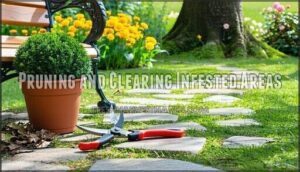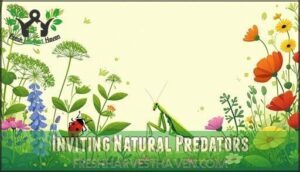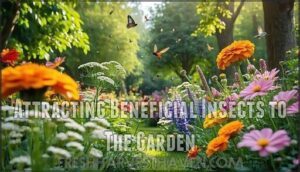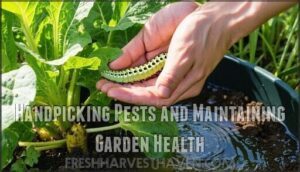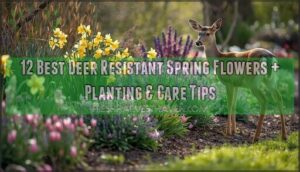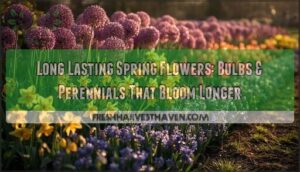This site is supported by our readers. We may earn a commission, at no cost to you, if you purchase through links.
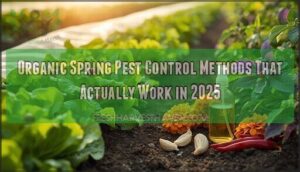
Start with physical barriers like row covers and sticky traps to block pests before they establish. Deploy beneficial insects such as ladybugs and lacewings as your garden’s natural security team.
Apply neem oil and insecticidal soap weekly for consistent protection. Create homemade sprays using garlic, chili, or soap solutions that pests can’t stand.
Companion planting with marigolds, basil, and nasturtiums acts like a natural fence around vulnerable crops. These proven techniques form a defense system that’s safer for your family and more effective than you might expect, using methods that are safer and more effective.
Table Of Contents
- Key Takeaways
- Organic Spring Pest Control
- Natural Pest Control Methods
- Preventing Pest Infestations
- Top 4 Organic Pest Control Products
- Integrated Pest Management
- Effective Organic Gardening
- Frequently Asked Questions (FAQs)
- How do organic farmers control pests without chemicals?
- What is the holistic approach to pest control?
- What is the best organic pest control recommended and why?
- What is the organic approach to pest control?
- What is the best organic pest control?
- How do organic farmers keep pests away?
- Does organic pest control really work?
- How to protect fruit trees from pests?
- What are effective methods for slug control?
- Can organic methods control indoor plant pests?
- Conclusion
Key Takeaways
- Start with physical barriers early – You’ll prevent most pest problems by installing row covers and sticky traps before infestations establish, creating an effective first line of defense that blocks insects while allowing sunlight through.
- Deploy beneficial insects as your natural security team – You can eliminate up to 50 aphids daily per ladybug by attracting natural predators like lacewings and parasitic wasps through diverse plantings and avoiding pesticides.
- Apply organic sprays consistently – You’ll achieve better results using neem oil weekly and insecticidal soap at 2% strength during cooler hours, as these disrupt pest life cycles without harming beneficial insects.
- Create companion plant barriers – You’ll reduce pest populations by 30-60% when you strategically plant marigolds, basil, and garlic around vulnerable crops, as these release natural compounds that confuse and repel harmful insects.
Organic Spring Pest Control
Spring gardening brings fresh growth and hungry pests looking for their first meal of the season.
You’ll need proven organic methods that protect your plants without harming beneficial insects or contaminating your soil.
Physical Barriers for Pest Control
Physical barriers serve as your garden’s armor against unwanted pests. Row covers and insect netting create effective physical shields that block insects while allowing sunlight and water to reach your plants.
Transform your garden into nature’s fortress with simple barriers that shield plants while letting sunshine through.
Choose materials with fine mesh openings to prevent even tiny pests from penetrating your defenses. Here’s how to maximize their effectiveness:
- Install garden barriers early in spring before pest populations establish
- Select durable materials that withstand weather and regular handling
- Inspect covers weekly for tears or gaps that compromise protection
- Secure edges properly to prevent pest entry underneath
- Remove temporarily during flowering for pollination access
These physical barriers offer dual benefits – pest exclusion and weather protection for vulnerable seedlings. Using row cover products can provide additional protection and support for your garden.
Biological Pest Control Methods
Several beneficial insects can transform your garden into a pest-fighting powerhouse.
These natural predators work around the clock to keep harmful bugs in check.
Here’s your biological pest control toolkit:
- Ladybugs devour up to 50 aphids daily while targeting scale insects and mites
- Lacewings (aphid lions) hunt aphids, caterpillars, and mealybugs aggressively
- Parasitic wasps lay eggs inside pests, with larvae consuming hosts from within
- Nematodes attack soil-dwelling grubs and root weevils below ground
- Predatory beetles patrol your garden, eliminating various crawling pests naturally
Importance of Row Covers
Spring’s arrival brings excitement—and unwelcome pests. Row covers serve as your garden’s first line of defense, creating an effective pest barrier while maintaining ideal growing conditions. These crop shields block aphids, cabbage moths, and flea beetles without chemicals.
Choose lightweight, breathable row cover materials that allow 85% light transmission. Install garden netting early in the season for maximum protection. Secure edges tightly to prevent pest entry points.
| Feature | Benefit | Best Use |
|---|---|---|
| Light Fabric | Allows airflow, blocks insects | Warm weather crops |
| Heavy Fabric | Frost protection + pest control | Cool season vegetables |
| Insect Netting | Maximum ventilation, pest exclusion | Heat-sensitive plants |
| Installation | Early season coverage | Seedling protection |
| Maintenance | Regular inspection for tears | Season-long effectiveness |
This physical barriers approach forms the backbone of organic spring pest control, delivering results without compromising soil health.
Natural Pest Control Methods
You can harness nature’s own pest control army to protect your spring garden without harsh chemicals.
These biological and organic methods work with natural systems to create long-term pest management solutions that keep your plants healthy, utilizing biological methods.
Beneficial Insects for Pest Control
When you introduce beneficial insects like ladybugs and lacewings into your garden, you’re recruiting nature’s most effective pest control team.
Ladybugs devour up to 50 aphids daily, while lacewing larvae consume hundreds of pests including mites and thrips.
Parasitic wasps target caterpillars, and predatory beetles handle soil-dwelling insects, and praying mantises provide additional hunting power against larger pests.
These natural allies thrive among diverse plantings like dill and marigolds, which attract pollinators too.
By adopting an integrated pest management approach, gardeners can create a balanced ecosystem that fosters the growth of beneficial insects.
Organic Sprays and Natural Solutions
While beneficial insects work around the clock, organic sprays give you direct control when pest pressure mounts.
Natural pesticides deliver targeted action without synthetic chemicals.
Top Natural Solutions:
- Neem Oil – disrupts 400+ pest species’ reproductive cycles
- Garlic Spray – repels aphids and caterpillars with pungent compounds
- Chili Pepper spray – capsaicin deters soft-bodied insects effectively
- Diatomaceous Earth – cuts through pest exoskeletons, causing dehydration
- Pyrethrin – paralyzes garden pests on contact, breaks down quickly
Using neem oil products can enhance the effectiveness of your organic pest control strategy.
Apply these organic sprays during cooler morning hours for maximum effectiveness.
Using Neem Oil and Insecticidal Soap
Two powerhouse Natural Repellents deliver knockout results when combined strategically. Neem Oil Benefits include disrupting over 200 pest species’ hormonal systems, achieving 90% aphid reduction within seven days of consistent application. Insecticidal Soap dissolves soft-bodied insects’ protective layers, causing fatal dehydration with 80-100% elimination rates during field trials.
Neem oil and insecticidal soap offer safe, natural solutions to protect plants while effectively disrupting Pest Life Cycles.
Apply neem oil weekly at 0.5-2% concentration targeting early instar stages. Use insecticidal soap at 2% strength during cooler morning or evening hours to prevent leaf burn.
These Organic Sprays work as contact-based treatments requiring direct application for maximum effectiveness in your spring pest management strategy. Effective implementation of natural pest control methods can substantially reduce the reliance on chemical pesticides.
Preventing Pest Infestations
You can prevent most spring pest problems by staying one step ahead with proactive garden maintenance.
Smart preparation now saves you from battling established infestations later when pests are harder to control.
Pruning and Clearing Infested Areas
Debris removal starts your spring garden cleanup. Remove damaged branches and diseased foliage from infested plants using clean pruning tools. Don’t cut more than one-third of any plant.
Clear fallen leaves, dead stems, and plant debris where pests overwinter. Sanitation methods matter—wipe pruning shears with rubbing alcohol between cuts to prevent spreading diseases.
This targeted garden pest management approach eliminates hiding spots and supports healthy organic pest control throughout your pest prevention strategy. Effective disease control strategies are essential for maintaining a healthy garden ecosystem.
Nourishing Plants With Compost
Strong, healthy plants naturally repel pests better than weak ones.
Compost Benefits your garden by enriching soil with essential nutrients and beneficial microorganisms that support robust plant growth.
- Improves soil structure for better water retention
- Feeds plants with Organic Fertilizers naturally
- Promotes beneficial microbes that fight diseases
- Enhances overall plant resistance to pests
- Strengthens root systems through Soil Enrichment
This Garden Recycling approach creates a foundation for effective Natural Pest Control in your spring garden.
Inviting Natural Predators
Healthy soil creates strong plants that resist pests naturally.
Now you’ll want to roll out the welcome mat for nature’s pest control squad. Ladybugs and praying mantises patrol your garden like security guards, while beneficial wasps hunt down troublemakers.
| Natural Guardians | Daily Pest Control | Ecosystem Balance |
|---|---|---|
| Ladybugs eat 50+ aphids | Lacewings devour mites | Birds consume thousands of insects |
| Parasitic wasps target caterpillars | Predatory beetles hunt soil pests | Diverse habitats support all allies |
| Ground beetles patrol at night | Spiders catch flying insects |
Balanced food webs prevent outbreaks.
Plant dill, fennel, and native flowers to create ladybug habitats. Add shallow water dishes and avoid pesticides. Predator attraction works best when you provide year-round shelter and food sources for these biological controls.
Top 4 Organic Pest Control Products
While you’re setting up physical barriers and beneficial insects, specific products can supercharge your organic pest control strategy this spring.
These four proven solutions target different pest categories effectively, giving you thorough protection without synthetic chemicals, which is a key part of a successful spring strategy.
1. Yellow Sticky Traps for Flying Insects

Yellow sticky traps work as pest magnets, drawing flying insects with their bright color before trapping them on non-toxic adhesive surfaces.
These fly traps excel at catching fungus gnats, aphids, and whiteflies that damage your spring garden.
You’ll find these pest stickers incredibly versatile for both indoor houseplants and outdoor growing areas.
Place your sticky papers strategically near affected plants, but don’t let them touch leaves directly.
The gridded surface makes monitoring pest activity straightforward – you’ll see exactly what you’re dealing with.
For trap placement, position them at plant height where flying insects naturally move.
When facing stubborn infestations, combine these insect nets with beneficial nematodes for thorough organic pest control.
This integrated pest management approach gives you natural pest control methods that protect kids, pets, and beneficial insects while maintaining your organic spring gardening goals.
Best For: Gardeners seeking safe, effective solutions for flying pest management.
2. Bonide Hot Pepper Animal Repellent
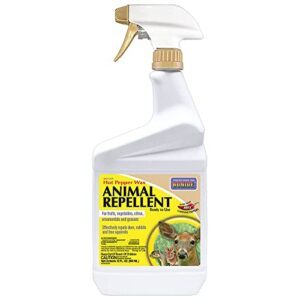
While sticky traps catch flying pests, you’ll need different tactics for ground-based invaders. Bonide Hot Pepper Animal Repellent harnesses capsaicin from cayenne peppers to create an effective wildlife control barrier that protects your spring garden from destructive mammals.
This animal deterrent safeguards fruits, vegetables, and ornamentals from deer, rabbits, and squirrels for up to four weeks per application. The hot pepper spray formula works as a natural pest control solution that won’t harm animals—just discourages them from treating your garden like an all-you-can-eat buffet.
For ideal organic pest control results with this natural insecticide, follow these application guidelines:
- Apply pepper spray to damp foliage during calm weather conditions
- Reapply repellent granules after rainfall or irrigation events
- Combine with physical barriers for enhanced wildlife control protection
- Target problem areas where animal damage appears most frequently
- Store unused product in cool, dry locations away from children
This humane approach fits perfectly into your organic gardening tips arsenal.
3. Garlic Block Organic Insect Repellent
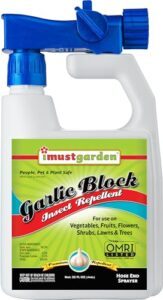
Garlic Block Organic Insect Repellent harnesses nature’s own pest deterrents to keep your garden protected.
This natural insecticide creates an effective barrier against aphids, beetles, and spider mites without harsh chemicals.
Unlike homemade pesticides that require mixing, this ready-to-use formula saves you time and effort.
The concentrated garlic spray delivers consistent results across vegetables, fruits, and flowers.
You’ll appreciate how this organic pest control solution repels insects while staying safe around kids and pets.
The strong odor dissipates quickly, so you won’t smell garlic lingering in your yard.
Regular application builds natural barriers that discourage reinfestation.
This organic repellent also deters larger pests like deer and rabbits, giving you thorough insect control in one product.
Best For: Organic gardeners seeking effective, ready-to-use natural pest deterrents for complete garden protection.
4. NatureZ Edge Marigold Seeds Mix
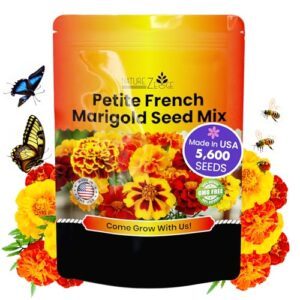
NatureZ Edge’s marigold seed mix transforms your garden into a pest-deterrent powerhouse. This GMO-free blend contains over 5,600 seeds that create natural barriers against harmful insects while attracting beneficial predators like ladybugs and parasitic wasps.
The flower power of marigolds releases compounds that repel nematodes, aphids, and whiteflies—making them perfect for companion planting with vegetables. These vibrant blooms thrive in USDA zones 1-12, germinating quickly with minimal care.
Smart seed selection means you’ll get diverse colors and varieties that support marigold benefits throughout the growing season. For effective organic spring pest control, plant borders around vulnerable crops or scatter throughout garden beds.
Their continuous blooms provide season-long protection while enhancing organic pest control strategies. Gardening tips: Space seeds 6 inches apart for ideal coverage and maximum natural pest deterrent effectiveness.
Best For: All skill levels seeking low-maintenance pest deterrents that beautify gardens naturally.
Integrated Pest Management
Integrated pest management combines multiple organic strategies to create a balanced ecosystem that naturally suppresses pest populations while minimizing environmental impact.
You’ll achieve the best results by rotating crops, monitoring pest levels regularly, and using targeted approaches like trap crops that lure pests away from your main plants, which is a key part of integrated pest management.
Crop Rotation and Soil Health
Crop rotation transforms your garden’s soil health into a pest-fighting powerhouse.
Rotating crops disrupts pest life cycles, reducing spring infestations by 30% while boosting nutrient cycling.
Crop diversity increases beneficial microbes by 22%, creating natural organic pest control.
Effective farm planning includes soil testing to optimize rotations.
Adding compost enhances soil fertility, making plants naturally resilient.
This integrated pest management approach builds long-term garden strength.
Monitoring and Adjusting Pest Control
Building on healthy soil practices, you’ll need smart pest monitoring to catch problems early. Crop Scouting weekly lets you spot pest eggs before they hatch into hungry armies.
Track Pest Forecasting data and conduct Damage Assessment regularly. Soil Testing reveals if stressed plants attract more pests. Adjust your organic pest solutions based on what you find.
Pest Tracking helps you stay one step ahead:
- Early detection saves your entire harvest
- Weekly scouting prevents costly crop losses
- Data tracking reveals which methods work best
- Timely interventions protect beneficial insects
- Smart monitoring reduces spray applications
Using Trap Crops and Pheromone Traps
Strategic pest lures work like magnets for garden troublemakers. You’ll plant trap crops like mustard or nasturtiums around your main vegetables, then add pheromone traps nearby. This combination creates a pest control powerhouse.
| Trap Crop | Target Pest |
|---|---|
| Black Mustard | Stink Bugs |
| Nasturtiums | Aphids |
| Sorghum | Various Moths |
| Marigolds | Nematodes |
Allocate 5-20% of your garden space for trap crops. Position them as barriers around vulnerable plants or scatter throughout larger areas. Pheromone traps placed strategically can reduce pest populations by up to 40% when combined with monitoring data to time interventions perfectly.
Effective pest management techniques are essential for a healthy garden ecosystem.
Effective Organic Gardening
You can transform your garden into a pest-resistant ecosystem through strategic companion planting and biological partnerships.
These proven organic methods work hand-in-hand with beneficial insects to create natural defense systems that protect your plants while maintaining soil health, utilizing biological partnerships.
Companion Planting for Pest Control
While IPM provides the framework, companion planting serves as your garden’s natural defense system.
Strategic Plant Partners create powerful pest deterrents through scent confusion and habitat manipulation.
- Marigold Benefits include releasing alpha-terthienyl, which suppresses root-knot nematodes by up to 37%
- Basil planted with tomatoes reduces thrips and whiteflies by 43% in field trials
- Garlic among carrots lowers aphid populations by 61% compared to single-crop gardens
These Crop Guardians work as Garden Allies, disrupting pest host-finding while supporting natural predators.
Attracting Beneficial Insects to The Garden
You’ll transform your garden into a beneficial bug haven by planting pollinator plants like dill, fennel, and marigolds.
These attracting beneficial insects magnets draw ladybugs, lacewings, and praying mantises that devour garden pests.
Create insect hotels using hollow stems and brush piles for nesting sites.
This garden diversity approach builds bee friendly spaces while establishing natural pest control that works around the clock.
Effective organic gardening often relies on organic pest control methods to maintain a healthy ecosystem.
Handpicking Pests and Maintaining Garden Health
Beyond attracting natural predators, you’ll need hands-on garden sanitation for complete organic pest control.
Handpicking pests during regular pest inspection stops infestations quickly. Remove visible caterpillars, beetles, and aphids by hand into soapy water.
Support this with proper soil fertility and plant pruning for ideal garden health. Effective methods involve using organic pest control techniques to minimize harm to the environment.
- Feel the satisfaction of personally protecting each plant
- Experience peace knowing you’re avoiding harmful chemicals
- Enjoy the therapeutic rhythm of mindful garden hygiene
Frequently Asked Questions (FAQs)
How do organic farmers control pests without chemicals?
An ounce of prevention’s worth a pound of cure—you’ll use beneficial insects, row covers, companion planting, crop rotation, neem oil, and biological controls to manage pests naturally without synthetic chemicals.
What is the holistic approach to pest control?
You’ll create a balanced ecosystem using multiple strategies together. Combine physical barriers, beneficial insects, organic treatments, and preventive practices. This integrated approach builds natural defenses while maintaining harmony.
What is the best organic pest control recommended and why?
Neem oil, biological controls, and row covers work together seamlessly. You’ll find neem oil disrupts 400+ pest species’ life cycles without harming beneficial insects, making it your safest bet.
What is the organic approach to pest control?
You’ll prevent pest problems by combining physical barriers, beneficial insects, and natural sprays. Use row covers for protection, attract ladybugs for aphid control, and apply neem oil treatments when needed.
What is the best organic pest control?
Ladybugs consume up to 50 aphids daily, making integrated pest management your strongest defense.
You’ll get best results combining neem oil, beneficial insects, and row covers while maintaining healthy soil through composting.
How do organic farmers keep pests away?
You’ll find success using companion plants like marigolds, beneficial insects such as ladybugs, crop rotation, physical barriers like row covers, and natural sprays including neem oil to maintain pest-free crops.
Does organic pest control really work?
Yes, organic pest control absolutely works when you apply proven methods consistently.
Research shows beneficial insects like ladybugs eliminate up to 50 aphids daily, while neem oil disrupts 400+ pest species effectively without harmful residues.
How to protect fruit trees from pests?
Install row covers early to shield developing fruit from flying insects.
Apply neem oil weekly during bloom to disrupt pest life cycles.
Encourage beneficial insects like ladybugs with diverse plantings nearby.
What are effective methods for slug control?
Picture slimy trails glistening across your garden beds at dawn.
You’ll crush slugs naturally using beer traps, crushed eggshells, or diatomaceous earth barriers.
Hand-pick them during evening hours for immediate results.
Can organic methods control indoor plant pests?
You can tackle indoor plant pests using neem oil for aphids and spider mites.
Insecticidal soap can be used for soft-bodied insects, diatomaceous earth for crawling pests.
Sticky traps are effective for flying bugs like fungus gnats.
Conclusion
Nature builds the strongest fortresses through cooperation, not conquest.
Your garden becomes this living fortress when you embrace organic spring pest control methods that work alongside natural systems.
These science-backed approaches create sustainable protection while safeguarding beneficial insects and soil health.
You’ll find success combining physical barriers, beneficial predators, and targeted organic sprays.
Monitor regularly and adjust your strategy based on pest pressure and plant response.
This integrated approach delivers effective results while protecting your family’s health and the environment.
- https://www.facebook.com/sharer.php?u=https%3A%2F%2Fbrightlanegardens.com%2Fgardening-basics%2Forganic-gardening%2F6-methods-for-natural-pest-control%2F&t=6%20Methods%20For%20Natural%20Pest%20Control
- https://x.com/intent/post?turl=https%3A%2F%2Fbrightlanegardens.com%2Fgardening-basics%2Forganic-gardening%2F6-methods-for-natural-pest-control%2F&text=6%20Methods%20For%20Natural%20Pest%20Control
- https://reddit.com/submit?url=https://brightlanegardens.com/gardening-basics/organic-gardening/6-methods-for-natural-pest-control/&title=6%20Methods%20For%20Natural%20Pest%20Control
- https://today.tamu.edu/2020/01/15/study-shows-organic-wounds-improve-produce/

